
The Japanese political process has two types of elections.

Yukishige Okubo is a Japanese politician of the Democratic Party of Japan, a fmember of the House of Councillors in the Diet. A native of Isahaya, Nagasaki and graduate of Nagasaki University, he had served in the assembly of Nagasaki Prefecture since 2003. After running unsuccessfully for the House of Representatives in 2005, he was elected to the House of Councillors for the first time in 2007.

HKT48 is a Japanese idol group produced by Yasushi Akimoto. HKT48 is named after the Hakata-ku, Fukuoka city of Fukuoka Prefecture, where Akimoto originally intended to base the group. The group currently performs at City Bank HKT48 Theater in Fukuoka and has sold nearly 4 million copies of CDs in Japan.
The following lists events that happened during 2016 in Japan.
The Hyogo at-large district is a constituency that represents Hyogo Prefecture in the House of Councillors in the Diet of Japan. It currently has five Councillors in the 242-member house, but this representation will increase to six by July 2019.

The Hyogo Prefectural Assembly is the prefectural parliament of Hyogo Prefecture.
The 2015 Hyōgo prefectural election was an election for the Hyogo Prefectural Assembly held on 12 April 2015 as part of the 2015 unified local elections in Japan. The election saw the number of assembly members reduced from 89 to 87 and the number of electoral districts reduced from 41 to 40. Voting was held in 23 districts and representatives for the remaining 17 districts were elected unopposed. The election was held in the wake of the political expenses scandal that was exposed in July 2014 involving multiple assembly members and was notable for former assemblyman Ryutaro Nonomura's outburst of uncontrolled sobbing at a news conference.
The 2015 Nishinomiya by-election was a by-election held on 25 January 2015 to fill two vacancies in the seven-member Nishinomiya district of the Hyogo Prefectural Assembly.
The Fukushima at-large district is a constituency that represents Fukushima Prefecture in the House of Councillors in the Diet of Japan. It currently has three Councillors in the 242-member house.
The Niigata at-large district is a constituency that represents Niigata Prefecture in the House of Councillors in the Diet of Japan. Since July 2019, it has two Councillors in the 242-member house, a decrease from its previous contingent of 3.
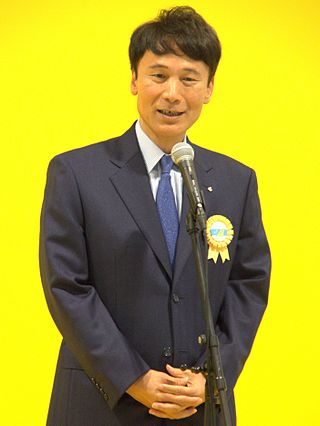
Satoshi Mitazono is a Japanese politician and journalist who is the former governor of Kagoshima Prefecture. He defeated the incumbent Yūichirō Itō at an election held on 10 July 2016.
The 2016 Kagoshima gubernatorial election was held on 10 July 2016 and contested by the three-term incumbent Yuichiro Ito and political journalist Satoshi Mitazono. Ito was denied a fourth term in office, as Mitazono received 55% of the vote following a campaign based primarily on change as well as opposition to the prefecture's operating nuclear power plant. The election was held on the same day as the national House of Councillors election, which helped increase voter turnout to 58.6%, compared to 43.8% at the previous election in 2012.
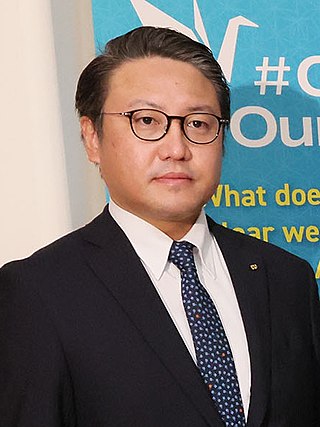
The 2022 Nagasaki gubernatorial election was a gubernatorial election held on 20 February 2022 to elect the next governor of Nagasaki, a prefecture of Japan in the north-west of Kyushu.
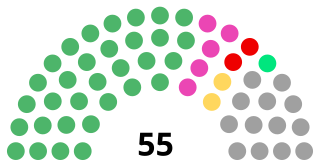
The 2019 Okayama Prefectural Assembly election was held on 7 April 2019 to elect the 55 members of the Okayama Prefectural Assembly.
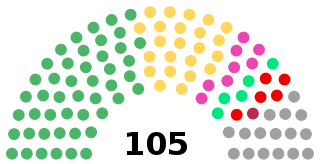
The 2019 Kanagawa Prefectural Assembly Election was held on 7 April 2019 to elect the 105 members of the Kanagawa Prefectural Assembly.

The 2019 Aichi Prefectural Assembly Election was held on 7 April to elect the 102 members of the Aichi Prefectural Assembly.
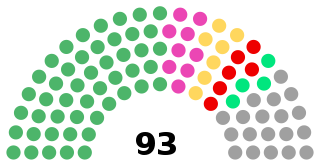
The 2019 Saitama Prefectural Assembly Election was held on 7 April to elect the 93 members of the Saitama Prefectural Assembly.
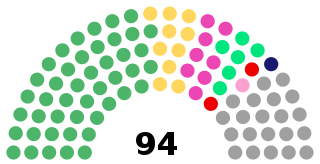
The 2019 Chiba Prefectural Assembly Election was held on 7 April, the first half voting day of the 19th Unified Local Elections of Japan.
Prefectural elections was held in Hyōgo Prefecture on 7 April 2019 to elect the members of Hyogo Prefectural Assembly. The elections took place on the first day of the 2019 Japanese unified local elections.
Prefectural elections were held in Hokkaido Prefecture on 7 April 2019 to elect the members of the Hokkaido Prefectural Assembly. It saw the election of Ayako Fuchigami, the first sexual minority politician to be elected to a Japanese prefectural assembly.














